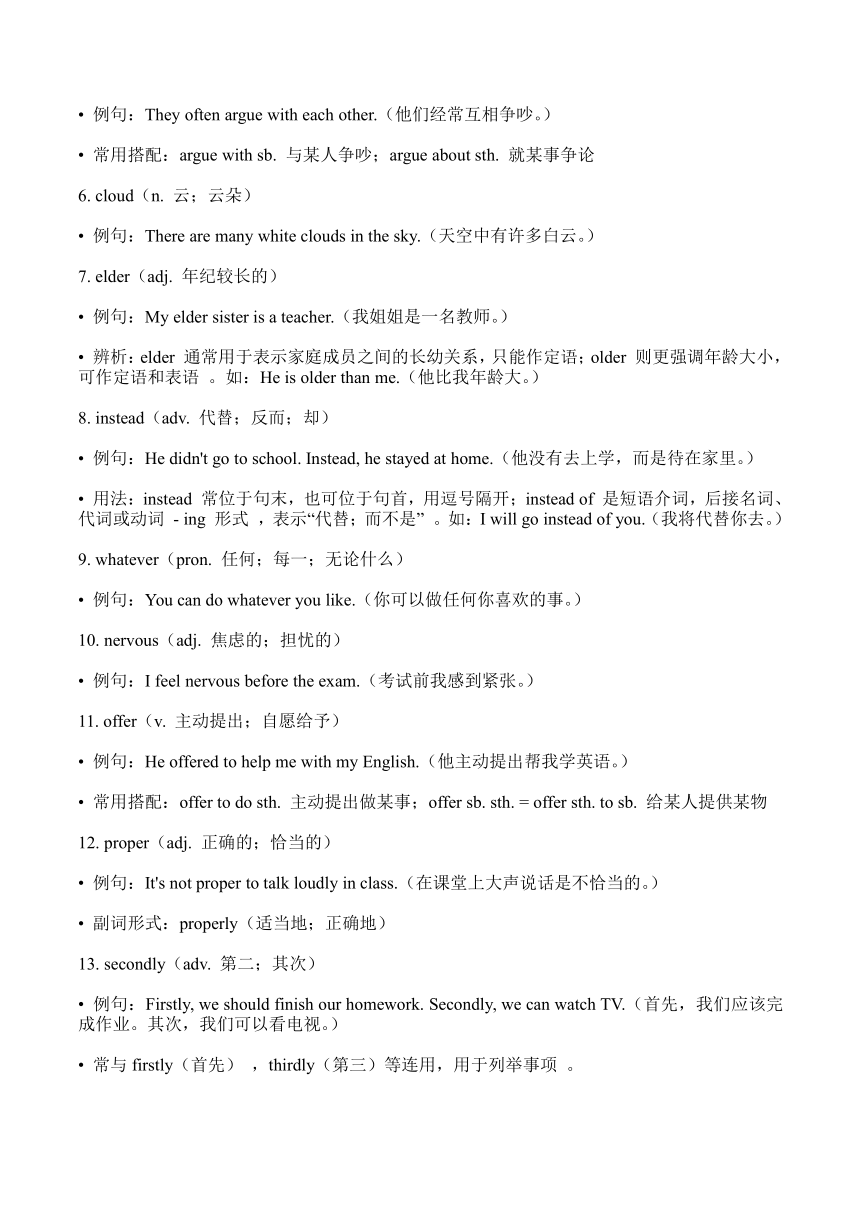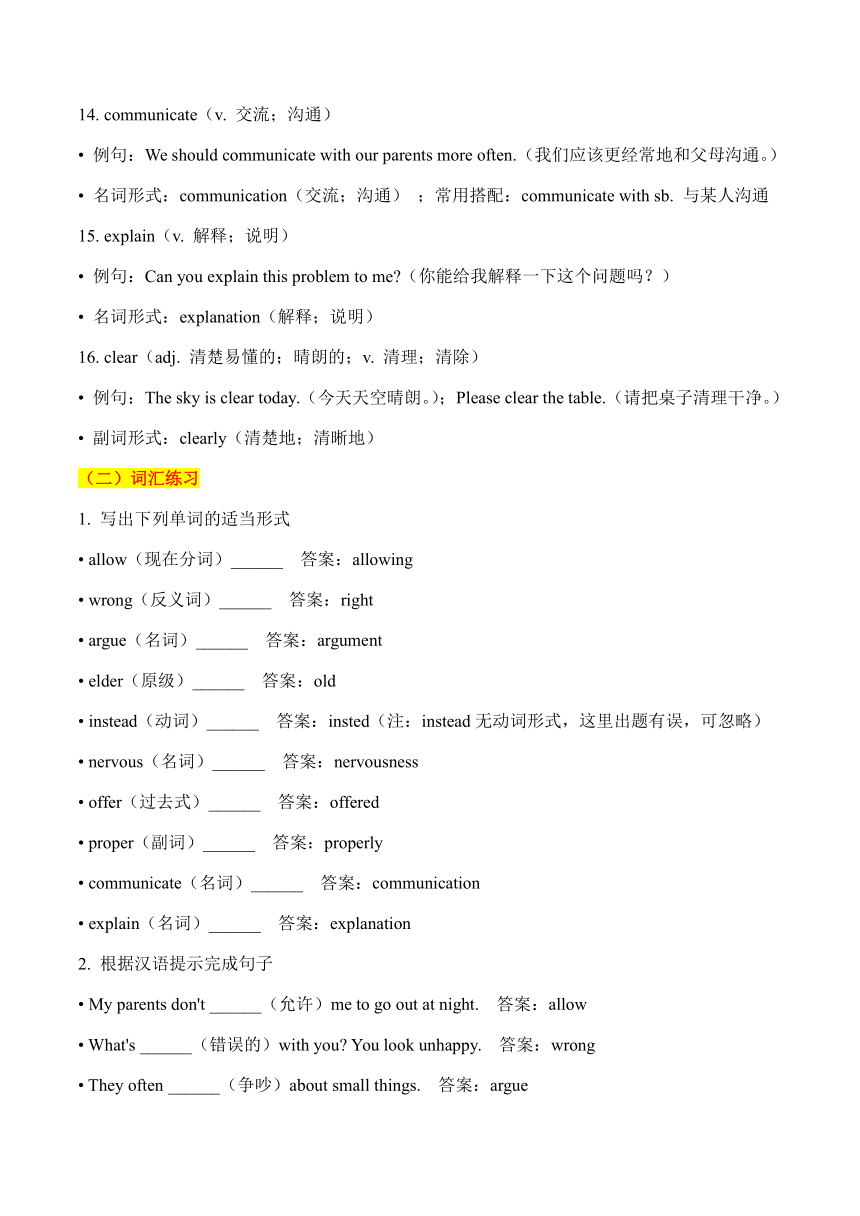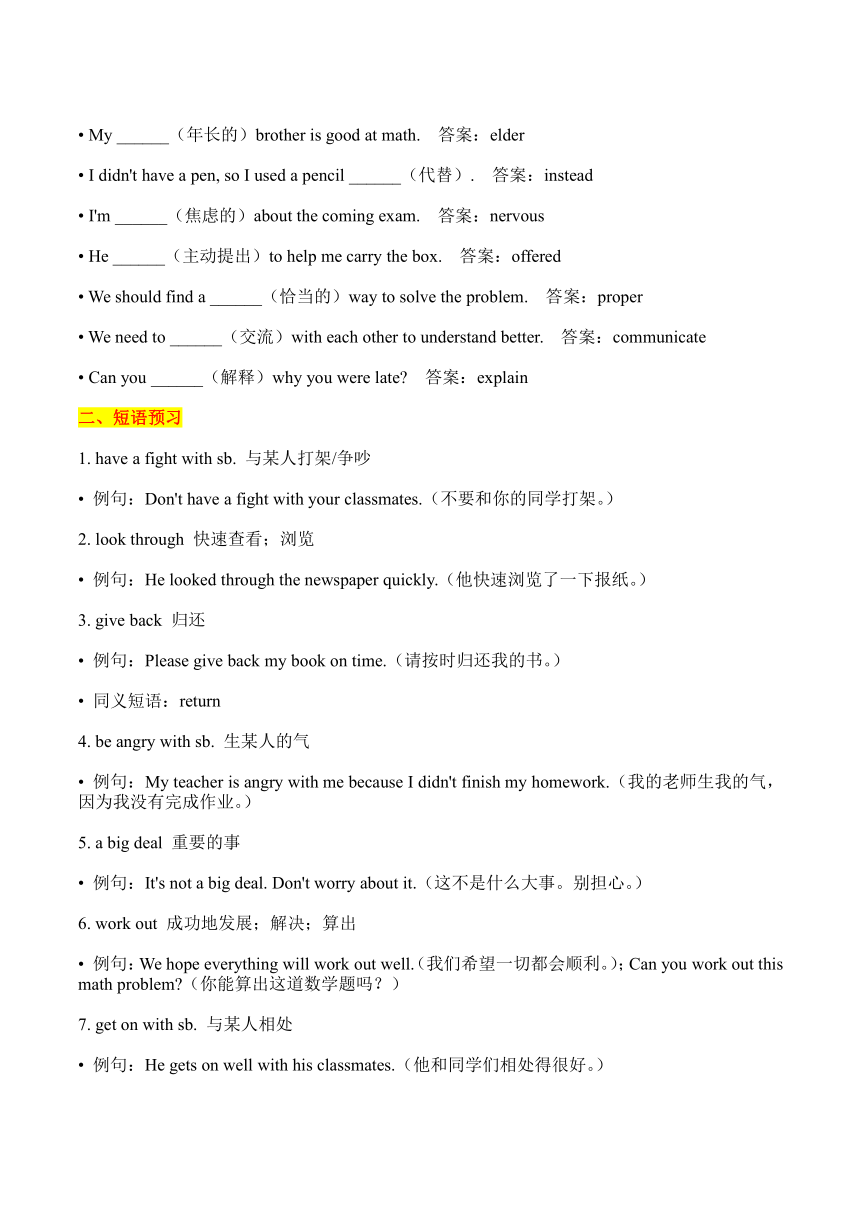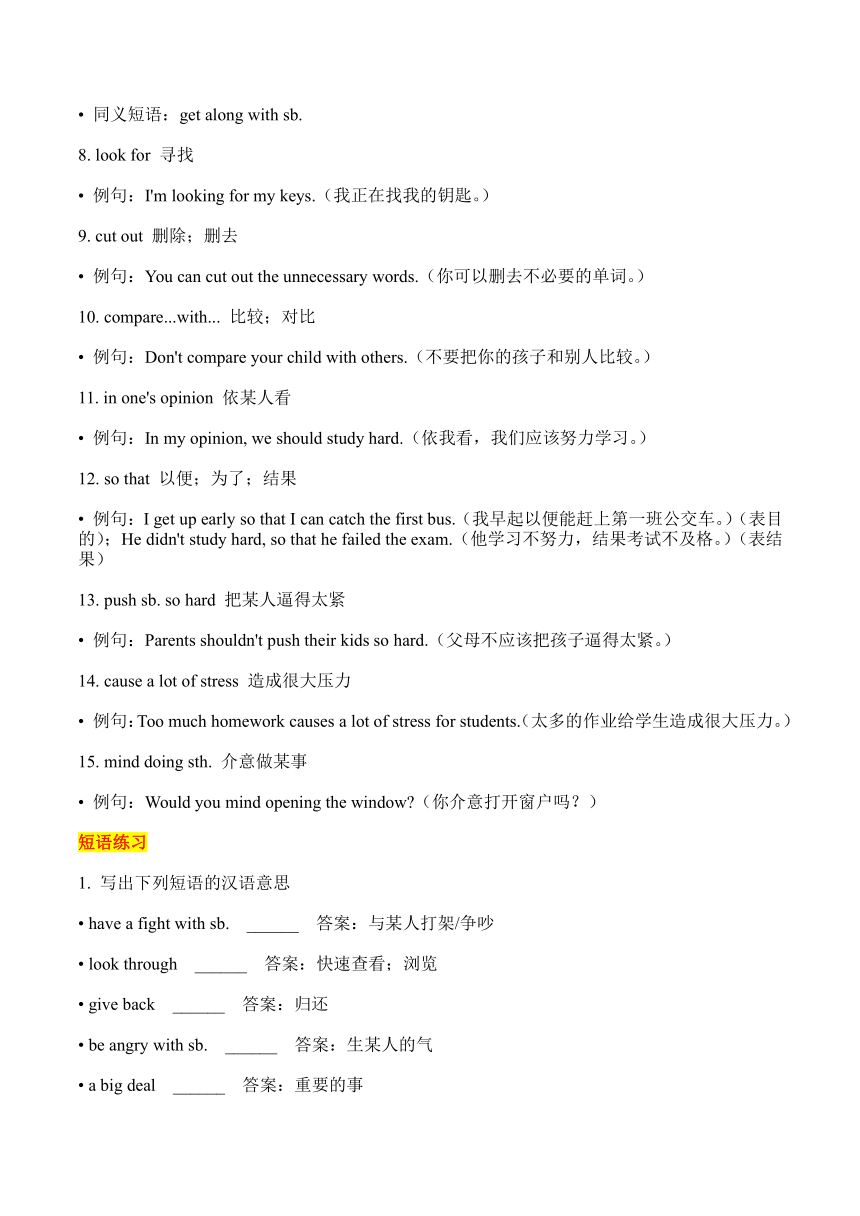Unit 4 Why don't you talk to your parents知识清单及导学案 【寒假预习】人教版英语八年级下册
文档属性
| 名称 | Unit 4 Why don't you talk to your parents知识清单及导学案 【寒假预习】人教版英语八年级下册 |  | |
| 格式 | docx | ||
| 文件大小 | 33.2KB | ||
| 资源类型 | 教案 | ||
| 版本资源 | 人教新目标(Go for it)版 | ||
| 科目 | 英语 | ||
| 更新时间 | 2025-01-12 21:10:16 | ||
图片预览





文档简介
Unit 4 Why don't you talk to your parents
知识清单/导学案 【寒假预习】
2025人教版英语八年级下册
使用说明:
《人教版英语八年级下册四单元寒假知识清单/导学案 【寒假预习】》,是依据课程标准及教材内容精心编制的英语学习指导方案,专为八年级学生寒假自主预习设计。
该清单对单元知识进行了全面且系统的梳理,涵盖词汇、短语、句型、语法以及课文等多个重要板块。在词汇部分,不仅对重点单词的词义、用法、变形及相关短语进行了详细阐释,还配备了针对性练习,帮助学生扎实掌握词汇;短语板块通过列举常用短语及其例句,强化学生对短语的理解与运用;句型板块深入剖析了单元中的关键句型,并设置多种练习,提升学生的语言表达能力。
一、词汇预习
(一)重点单词
1. allow(v. 允许;准许)
例句:My parents allow me to watch TV on weekends.(我父母允许我在周末看电视。)
常用搭配:allow sb. to do sth. 允许某人做某事;be allowed to do sth. 被允许做某事
2. wrong(adj. 错误的;不对的)
例句:You are wrong.(你错了。)
常用短语:What's wrong 怎么了? 相当于What's the matter / What's the trouble
3. guess(v. 猜测;估计)
例句:Can you guess the answer (你能猜出答案吗?)
4. deal(n. 协议;交易)
例句:It's a good deal.(这是一笔划算的交易。)
常用短语:make a deal 达成协议;成交 ;a big deal 重要的事
5. argue(v. 争吵;争论)
例句:They often argue with each other.(他们经常互相争吵。)
常用搭配:argue with sb. 与某人争吵;argue about sth. 就某事争论
6. cloud(n. 云;云朵)
例句:There are many white clouds in the sky.(天空中有许多白云。)
7. elder(adj. 年纪较长的)
例句:My elder sister is a teacher.(我姐姐是一名教师。)
辨析:elder 通常用于表示家庭成员之间的长幼关系,只能作定语;older 则更强调年龄大小,可作定语和表语 。如:He is older than me.(他比我年龄大。)
8. instead(adv. 代替;反而;却)
例句:He didn't go to school. Instead, he stayed at home.(他没有去上学,而是待在家里。)
用法:instead 常位于句末,也可位于句首,用逗号隔开;instead of 是短语介词,后接名词、代词或动词 - ing 形式 ,表示“代替;而不是” 。如:I will go instead of you.(我将代替你去。)
9. whatever(pron. 任何;每一;无论什么)
例句:You can do whatever you like.(你可以做任何你喜欢的事。)
10. nervous(adj. 焦虑的;担忧的)
例句:I feel nervous before the exam.(考试前我感到紧张。)
11. offer(v. 主动提出;自愿给予)
例句:He offered to help me with my English.(他主动提出帮我学英语。)
常用搭配:offer to do sth. 主动提出做某事;offer sb. sth. = offer sth. to sb. 给某人提供某物
12. proper(adj. 正确的;恰当的)
例句:It's not proper to talk loudly in class.(在课堂上大声说话是不恰当的。)
副词形式:properly(适当地;正确地)
13. secondly(adv. 第二;其次)
例句:Firstly, we should finish our homework. Secondly, we can watch TV.(首先,我们应该完成作业。其次,我们可以看电视。)
常与firstly(首先) ,thirdly(第三)等连用,用于列举事项 。
municate(v. 交流;沟通)
例句:We should communicate with our parents more often.(我们应该更经常地和父母沟通。)
名词形式:communication(交流;沟通) ;常用搭配:communicate with sb. 与某人沟通
15. explain(v. 解释;说明)
例句:Can you explain this problem to me (你能给我解释一下这个问题吗?)
名词形式:explanation(解释;说明)
16. clear(adj. 清楚易懂的;晴朗的;v. 清理;清除)
例句:The sky is clear today.(今天天空晴朗。);Please clear the table.(请把桌子清理干净。)
副词形式:clearly(清楚地;清晰地)
(二)词汇练习
1. 写出下列单词的适当形式
allow(现在分词)______ 答案:allowing
wrong(反义词)______ 答案:right
argue(名词)______ 答案:argument
elder(原级)______ 答案:old
instead(动词)______ 答案:insted(注:instead无动词形式,这里出题有误,可忽略)
nervous(名词)______ 答案:nervousness
offer(过去式)______ 答案:offered
proper(副词)______ 答案:properly
communicate(名词)______ 答案:communication
explain(名词)______ 答案:explanation
2. 根据汉语提示完成句子
My parents don't ______(允许)me to go out at night. 答案:allow
What's ______(错误的)with you You look unhappy. 答案:wrong
They often ______(争吵)about small things. 答案:argue
My ______(年长的)brother is good at math. 答案:elder
I didn't have a pen, so I used a pencil ______(代替). 答案:instead
I'm ______(焦虑的)about the coming exam. 答案:nervous
He ______(主动提出)to help me carry the box. 答案:offered
We should find a ______(恰当的)way to solve the problem. 答案:proper
We need to ______(交流)with each other to understand better. 答案:communicate
Can you ______(解释)why you were late 答案:explain
二、短语预习
1. have a fight with sb. 与某人打架/争吵
例句:Don't have a fight with your classmates.(不要和你的同学打架。)
2. look through 快速查看;浏览
例句:He looked through the newspaper quickly.(他快速浏览了一下报纸。)
3. give back 归还
例句:Please give back my book on time.(请按时归还我的书。)
同义短语:return
4. be angry with sb. 生某人的气
例句:My teacher is angry with me because I didn't finish my homework.(我的老师生我的气,因为我没有完成作业。)
5. a big deal 重要的事
例句:It's not a big deal. Don't worry about it.(这不是什么大事。别担心。)
6. work out 成功地发展;解决;算出
例句:We hope everything will work out well.(我们希望一切都会顺利。);Can you work out this math problem (你能算出这道数学题吗?)
7. get on with sb. 与某人相处
例句:He gets on well with his classmates.(他和同学们相处得很好。)
同义短语:get along with sb.
8. look for 寻找
例句:I'm looking for my keys.(我正在找我的钥匙。)
9. cut out 删除;删去
例句:You can cut out the unnecessary words.(你可以删去不必要的单词。)
pare...with... 比较;对比
例句:Don't compare your child with others.(不要把你的孩子和别人比较。)
11. in one's opinion 依某人看
例句:In my opinion, we should study hard.(依我看,我们应该努力学习。)
12. so that 以便;为了;结果
例句:I get up early so that I can catch the first bus.(我早起以便能赶上第一班公交车。)(表目的);He didn't study hard, so that he failed the exam.(他学习不努力,结果考试不及格。)(表结果)
13. push sb. so hard 把某人逼得太紧
例句:Parents shouldn't push their kids so hard.(父母不应该把孩子逼得太紧。)
14. cause a lot of stress 造成很大压力
例句:Too much homework causes a lot of stress for students.(太多的作业给学生造成很大压力。)
15. mind doing sth. 介意做某事
例句:Would you mind opening the window (你介意打开窗户吗?)
短语练习
1. 写出下列短语的汉语意思
have a fight with sb. ______ 答案:与某人打架/争吵
look through ______ 答案:快速查看;浏览
give back ______ 答案:归还
be angry with sb. ______ 答案:生某人的气
a big deal ______ 答案:重要的事
work out ______ 答案:成功地发展;解决;算出
get on with sb. ______ 答案:与某人相处
look for ______ 答案:寻找
cut out ______ 答案:删除;删去
compare...with... ______ 答案:比较;对比
in one's opinion ______ 答案:依某人看
so that ______ 答案:以便;为了;结果
push sb. so hard ______ 答案:把某人逼得太紧
cause a lot of stress ______ 答案:造成很大压力
mind doing sth. ______ 答案:介意做某事
2. 用适当的短语填空
I don't want to ______ my best friend. 答案:have a fight with
Please ______ my dictionary as soon as possible. 答案:give back
She is ______ her lost wallet everywhere. 答案:looking for
Can you help me ______ this problem 答案:work out
______, we should help each other. 答案:In my opinion
He got up early ______ he could arrive at school on time. 答案:so that
Don't ______ your children ______. It's not good for them. 答案:push; so hard
My parents always ______ me ______ other students. I'm very tired. 答案:compare; with
Do you ______ me ______ the window It's too hot here. 答案:mind; opening
You can ______ the unimportant details in this passage. 答案:cut out
三、句型预习
1. Why don't you do sth.
例句:Why don't you talk to your parents (你为什么不和你的父母谈谈呢?)
用法:这是一个提建议的句型,意为“你为什么不做某事呢?” ,相当于Why not do sth. ,后接动词原形 。
2. What should I do
例句:I lost my keys. What should I do (我丢了钥匙。我该怎么办?)
用法:用于询问对方自己应该怎么做,是寻求建议的常用句型 。
3. I found sb. doing sth.
例句:I found him reading a book in the library.(我发现他在图书馆看书。)
用法:表示“我发现某人正在做某事” ,强调动作正在进行 。
4. “It's + adj. + for sb. + to do sth.”
例句:It's important for us to learn how to communicate with others.(对我们来说,学习如何与他人沟通很重要。)
用法:it作形式主语,真正的主语是后面的动词不定式短语 ,for sb. 表示“对于某人来说” 。当形容词是描述人的性格、品质等时,用“of sb.” ,如:It's kind of you to help me.(你帮助我真是太好了。)
5. Although/Though...
例句:Although/Though he is very young, he can do many things by himself.(虽然他很年轻,但他能自己做很多事情。)
用法:although 和 though 都表示“虽然;尽管” ,引导让步状语从句,不能与 but 同时使用 。
句型练习
1. 按要求完成句子
Why not go to the park (改为同义句)
Why ______ ______ go to the park 答案:don't you
I should talk to my teacher.(对画线部分提问)
What ______ you ______ 答案:should; do
I found my sister looking through my things yesterday.(对画线部分提问)
What did you find your sister ______ yesterday 答案:doing
It's necessary for us to exercise every day.(改为一般疑问句)
______ it necessary for you to exercise every day 答案:Is
Although he is tired, he still keeps working.(改为同义句)
He is tired, ______ he still keeps working. 答案:but(注意:原句用了although,改写后用but,两者不能同时出现在一个句子中 )
2. 根据汉语提示完成句子
你为什么不向你的老师寻求帮助呢?
Why ______ ______ ask your teacher for help 答案:don't you
我该怎么解决这个问题呢?
What ______ I ______ to solve this problem 答案:should; do
我发现他正在教室里做作业。
I found him ______ his homework in the classroom. 答案:doing
对我们来说保持健康很重要。
It's important for us ______ ______ healthy. 答案:to keep
尽管她很忙,她还是经常帮我。
______ she is very busy, she often helps me. 答案:Although/Though
四、语法预习
(一)情态动词should的用法
1. 表示建议或劝告
例句:You should study hard.(你应该努力学习。)
用法:should意为“应该” ,后接动词原形 ,常用来给别人提出建议 ,其否定形式是shouldn't ,意为“不应该” 。
2. 表示推测
例句:He should be at home now.(他现在应该在家。)
用法:表示对现在情况的推测,语气比must弱 ,比may强 。
3. 用于虚拟语气
例句:It's important that we should learn English well.(我们学好英语很重要。)
用法:在一些表示建议、要求、命令等的形容词(如important, necessary, strange等)后的从句中,常用“should + 动词原形” ,should 可以省略 。
(二)until, so that, although引导的状语从句
1. until引导的时间状语从句
例句:I will wait until he comes back.(我会一直等到他回来。)
用法:until意为“直到……为止” ,表示主句的动作一直持续到从句动作发生时为止 。主句谓语动词如果是延续性动词,常用肯定形式;如果是短暂性动词,常用否定形式 ,即“not...until...” ,意为“直到……才……” 。如:He didn't leave until his mother came back.(直到他妈妈回来他才离开。)
2. so that引导的目的状语从句和结果状语从句
目的状语从句:例句:I get up early so that I can catch the first bus.(我早起以便能赶上第一班公交车。) ,so that意为“以便;为了” ,引导目的状语从句时,从句中常含有can, could, may, might等情态动词 。
结果状语从句:例句:He didn't study hard, so that he failed the exam.(他学习不努力,结果考试不及格。) ,so that意为“结果” ,引导结果状语从句时,从句中一般不用情态动词 ,且从句往往是前面主句行为导致的结果 。
3. although引导的让步状语从句
例句:Although it was raining heavily, he still went to school on time.(尽管雨下得很大,他仍然按时去上学。)
用法:although意为“虽然;尽管” ,引导让步状语从句,表示“虽然……但是……” ,在英语中,although不能与but同时使用 。
语法练习
1. 单项选择
You ______ eat more vegetables and less meat. It's good for your health.
A. should B. would C. could D. might 答案:A
I won't leave ______ you come back.
A. until B. so that C. although D. because 答案:A
She got up early ______ she could catch the early bus.
A. until B. so that C. although D. because 答案:B
______ he is very old, he still works hard.
A. Until B. So that C. Although D. Because 答案:C
You ______ talk loudly in the library.
A. should B. shouldn't C. can D. needn't 答案:B
It's strange that he ______ be late for school today.
A. should B. will C. may D. can 答案:A(这里“should”用于虚拟语气,在“it's strange that...”句型中,“should + 动词原形”,should可省略)
2. 用所给词的适当形式填空
You should ______ (say) sorry to your friend. 答案:say
He didn't go to bed until he ______ (finish) his homework. 答案:finished
She practices singing every day so that she ______ (can) win the singing competition. 答案:can
Although he ______ (be) tired, he helped his mother with the housework. 答案:was
It's important that we should ______ (protect) the environment. 答案:protect
五、课文预习
1. 阅读前准备
在预习Unit 4的3a - 3c及Self - Check部分文章前,先回顾本单元的重点词汇和短语,确保阅读时能顺利理解基本语义。例如,看到“allow”“argue”“communicate”等单词能快速反应其含义和用法。
2. 阅读过程
第一遍快速阅读,了解文章的大致内容和主题。例如,3a部分的文章可能围绕青少年面临的问题及解决办法展开,快速浏览后要能抓住核心话题。
第二遍精读,逐句分析句子结构。对于含有until、so that、although引导的状语从句的句子,要明确从句的类型和作用;对于出现的“should”相关的表达,分析其在句中的含义(是表建议、推测还是虚拟语气等) 。同时,标记出难以理解的句子,如复杂的长难句“He found it difficult to get on well with his classmates because he was always comparing himself with others.” ,分析其结构为“find + it + adj. + to do sth.”(发现做某事是……的),其中“because”引导原因状语从句 。
关注文章中的人物观点和态度。例如,作者对于青少年与父母沟通问题持怎样的看法,从文中哪些语句可以体现出来。
3. 阅读后
总结文章的主旨大意,用自己的话概括文章主要讲述了什么内容。比如,这篇文章主要讨论了青少年在与家人、朋友相处中遇到的问题,如争吵、沟通不畅等,并给出了一些解决这些问题的建议 。
思考文章中提出的问题和解决办法,结合自身实际情况,想想自己是否也遇到过类似问题,以及可以从中学到什么。
完成文章后面的练习题,通过做题检验自己对文章的理解程度。对于做错的题目,要仔细分析原因,是因为对文章内容理解有误,还是对相关语法知识掌握不牢。
知识清单/导学案 【寒假预习】
2025人教版英语八年级下册
使用说明:
《人教版英语八年级下册四单元寒假知识清单/导学案 【寒假预习】》,是依据课程标准及教材内容精心编制的英语学习指导方案,专为八年级学生寒假自主预习设计。
该清单对单元知识进行了全面且系统的梳理,涵盖词汇、短语、句型、语法以及课文等多个重要板块。在词汇部分,不仅对重点单词的词义、用法、变形及相关短语进行了详细阐释,还配备了针对性练习,帮助学生扎实掌握词汇;短语板块通过列举常用短语及其例句,强化学生对短语的理解与运用;句型板块深入剖析了单元中的关键句型,并设置多种练习,提升学生的语言表达能力。
一、词汇预习
(一)重点单词
1. allow(v. 允许;准许)
例句:My parents allow me to watch TV on weekends.(我父母允许我在周末看电视。)
常用搭配:allow sb. to do sth. 允许某人做某事;be allowed to do sth. 被允许做某事
2. wrong(adj. 错误的;不对的)
例句:You are wrong.(你错了。)
常用短语:What's wrong 怎么了? 相当于What's the matter / What's the trouble
3. guess(v. 猜测;估计)
例句:Can you guess the answer (你能猜出答案吗?)
4. deal(n. 协议;交易)
例句:It's a good deal.(这是一笔划算的交易。)
常用短语:make a deal 达成协议;成交 ;a big deal 重要的事
5. argue(v. 争吵;争论)
例句:They often argue with each other.(他们经常互相争吵。)
常用搭配:argue with sb. 与某人争吵;argue about sth. 就某事争论
6. cloud(n. 云;云朵)
例句:There are many white clouds in the sky.(天空中有许多白云。)
7. elder(adj. 年纪较长的)
例句:My elder sister is a teacher.(我姐姐是一名教师。)
辨析:elder 通常用于表示家庭成员之间的长幼关系,只能作定语;older 则更强调年龄大小,可作定语和表语 。如:He is older than me.(他比我年龄大。)
8. instead(adv. 代替;反而;却)
例句:He didn't go to school. Instead, he stayed at home.(他没有去上学,而是待在家里。)
用法:instead 常位于句末,也可位于句首,用逗号隔开;instead of 是短语介词,后接名词、代词或动词 - ing 形式 ,表示“代替;而不是” 。如:I will go instead of you.(我将代替你去。)
9. whatever(pron. 任何;每一;无论什么)
例句:You can do whatever you like.(你可以做任何你喜欢的事。)
10. nervous(adj. 焦虑的;担忧的)
例句:I feel nervous before the exam.(考试前我感到紧张。)
11. offer(v. 主动提出;自愿给予)
例句:He offered to help me with my English.(他主动提出帮我学英语。)
常用搭配:offer to do sth. 主动提出做某事;offer sb. sth. = offer sth. to sb. 给某人提供某物
12. proper(adj. 正确的;恰当的)
例句:It's not proper to talk loudly in class.(在课堂上大声说话是不恰当的。)
副词形式:properly(适当地;正确地)
13. secondly(adv. 第二;其次)
例句:Firstly, we should finish our homework. Secondly, we can watch TV.(首先,我们应该完成作业。其次,我们可以看电视。)
常与firstly(首先) ,thirdly(第三)等连用,用于列举事项 。
municate(v. 交流;沟通)
例句:We should communicate with our parents more often.(我们应该更经常地和父母沟通。)
名词形式:communication(交流;沟通) ;常用搭配:communicate with sb. 与某人沟通
15. explain(v. 解释;说明)
例句:Can you explain this problem to me (你能给我解释一下这个问题吗?)
名词形式:explanation(解释;说明)
16. clear(adj. 清楚易懂的;晴朗的;v. 清理;清除)
例句:The sky is clear today.(今天天空晴朗。);Please clear the table.(请把桌子清理干净。)
副词形式:clearly(清楚地;清晰地)
(二)词汇练习
1. 写出下列单词的适当形式
allow(现在分词)______ 答案:allowing
wrong(反义词)______ 答案:right
argue(名词)______ 答案:argument
elder(原级)______ 答案:old
instead(动词)______ 答案:insted(注:instead无动词形式,这里出题有误,可忽略)
nervous(名词)______ 答案:nervousness
offer(过去式)______ 答案:offered
proper(副词)______ 答案:properly
communicate(名词)______ 答案:communication
explain(名词)______ 答案:explanation
2. 根据汉语提示完成句子
My parents don't ______(允许)me to go out at night. 答案:allow
What's ______(错误的)with you You look unhappy. 答案:wrong
They often ______(争吵)about small things. 答案:argue
My ______(年长的)brother is good at math. 答案:elder
I didn't have a pen, so I used a pencil ______(代替). 答案:instead
I'm ______(焦虑的)about the coming exam. 答案:nervous
He ______(主动提出)to help me carry the box. 答案:offered
We should find a ______(恰当的)way to solve the problem. 答案:proper
We need to ______(交流)with each other to understand better. 答案:communicate
Can you ______(解释)why you were late 答案:explain
二、短语预习
1. have a fight with sb. 与某人打架/争吵
例句:Don't have a fight with your classmates.(不要和你的同学打架。)
2. look through 快速查看;浏览
例句:He looked through the newspaper quickly.(他快速浏览了一下报纸。)
3. give back 归还
例句:Please give back my book on time.(请按时归还我的书。)
同义短语:return
4. be angry with sb. 生某人的气
例句:My teacher is angry with me because I didn't finish my homework.(我的老师生我的气,因为我没有完成作业。)
5. a big deal 重要的事
例句:It's not a big deal. Don't worry about it.(这不是什么大事。别担心。)
6. work out 成功地发展;解决;算出
例句:We hope everything will work out well.(我们希望一切都会顺利。);Can you work out this math problem (你能算出这道数学题吗?)
7. get on with sb. 与某人相处
例句:He gets on well with his classmates.(他和同学们相处得很好。)
同义短语:get along with sb.
8. look for 寻找
例句:I'm looking for my keys.(我正在找我的钥匙。)
9. cut out 删除;删去
例句:You can cut out the unnecessary words.(你可以删去不必要的单词。)
pare...with... 比较;对比
例句:Don't compare your child with others.(不要把你的孩子和别人比较。)
11. in one's opinion 依某人看
例句:In my opinion, we should study hard.(依我看,我们应该努力学习。)
12. so that 以便;为了;结果
例句:I get up early so that I can catch the first bus.(我早起以便能赶上第一班公交车。)(表目的);He didn't study hard, so that he failed the exam.(他学习不努力,结果考试不及格。)(表结果)
13. push sb. so hard 把某人逼得太紧
例句:Parents shouldn't push their kids so hard.(父母不应该把孩子逼得太紧。)
14. cause a lot of stress 造成很大压力
例句:Too much homework causes a lot of stress for students.(太多的作业给学生造成很大压力。)
15. mind doing sth. 介意做某事
例句:Would you mind opening the window (你介意打开窗户吗?)
短语练习
1. 写出下列短语的汉语意思
have a fight with sb. ______ 答案:与某人打架/争吵
look through ______ 答案:快速查看;浏览
give back ______ 答案:归还
be angry with sb. ______ 答案:生某人的气
a big deal ______ 答案:重要的事
work out ______ 答案:成功地发展;解决;算出
get on with sb. ______ 答案:与某人相处
look for ______ 答案:寻找
cut out ______ 答案:删除;删去
compare...with... ______ 答案:比较;对比
in one's opinion ______ 答案:依某人看
so that ______ 答案:以便;为了;结果
push sb. so hard ______ 答案:把某人逼得太紧
cause a lot of stress ______ 答案:造成很大压力
mind doing sth. ______ 答案:介意做某事
2. 用适当的短语填空
I don't want to ______ my best friend. 答案:have a fight with
Please ______ my dictionary as soon as possible. 答案:give back
She is ______ her lost wallet everywhere. 答案:looking for
Can you help me ______ this problem 答案:work out
______, we should help each other. 答案:In my opinion
He got up early ______ he could arrive at school on time. 答案:so that
Don't ______ your children ______. It's not good for them. 答案:push; so hard
My parents always ______ me ______ other students. I'm very tired. 答案:compare; with
Do you ______ me ______ the window It's too hot here. 答案:mind; opening
You can ______ the unimportant details in this passage. 答案:cut out
三、句型预习
1. Why don't you do sth.
例句:Why don't you talk to your parents (你为什么不和你的父母谈谈呢?)
用法:这是一个提建议的句型,意为“你为什么不做某事呢?” ,相当于Why not do sth. ,后接动词原形 。
2. What should I do
例句:I lost my keys. What should I do (我丢了钥匙。我该怎么办?)
用法:用于询问对方自己应该怎么做,是寻求建议的常用句型 。
3. I found sb. doing sth.
例句:I found him reading a book in the library.(我发现他在图书馆看书。)
用法:表示“我发现某人正在做某事” ,强调动作正在进行 。
4. “It's + adj. + for sb. + to do sth.”
例句:It's important for us to learn how to communicate with others.(对我们来说,学习如何与他人沟通很重要。)
用法:it作形式主语,真正的主语是后面的动词不定式短语 ,for sb. 表示“对于某人来说” 。当形容词是描述人的性格、品质等时,用“of sb.” ,如:It's kind of you to help me.(你帮助我真是太好了。)
5. Although/Though...
例句:Although/Though he is very young, he can do many things by himself.(虽然他很年轻,但他能自己做很多事情。)
用法:although 和 though 都表示“虽然;尽管” ,引导让步状语从句,不能与 but 同时使用 。
句型练习
1. 按要求完成句子
Why not go to the park (改为同义句)
Why ______ ______ go to the park 答案:don't you
I should talk to my teacher.(对画线部分提问)
What ______ you ______ 答案:should; do
I found my sister looking through my things yesterday.(对画线部分提问)
What did you find your sister ______ yesterday 答案:doing
It's necessary for us to exercise every day.(改为一般疑问句)
______ it necessary for you to exercise every day 答案:Is
Although he is tired, he still keeps working.(改为同义句)
He is tired, ______ he still keeps working. 答案:but(注意:原句用了although,改写后用but,两者不能同时出现在一个句子中 )
2. 根据汉语提示完成句子
你为什么不向你的老师寻求帮助呢?
Why ______ ______ ask your teacher for help 答案:don't you
我该怎么解决这个问题呢?
What ______ I ______ to solve this problem 答案:should; do
我发现他正在教室里做作业。
I found him ______ his homework in the classroom. 答案:doing
对我们来说保持健康很重要。
It's important for us ______ ______ healthy. 答案:to keep
尽管她很忙,她还是经常帮我。
______ she is very busy, she often helps me. 答案:Although/Though
四、语法预习
(一)情态动词should的用法
1. 表示建议或劝告
例句:You should study hard.(你应该努力学习。)
用法:should意为“应该” ,后接动词原形 ,常用来给别人提出建议 ,其否定形式是shouldn't ,意为“不应该” 。
2. 表示推测
例句:He should be at home now.(他现在应该在家。)
用法:表示对现在情况的推测,语气比must弱 ,比may强 。
3. 用于虚拟语气
例句:It's important that we should learn English well.(我们学好英语很重要。)
用法:在一些表示建议、要求、命令等的形容词(如important, necessary, strange等)后的从句中,常用“should + 动词原形” ,should 可以省略 。
(二)until, so that, although引导的状语从句
1. until引导的时间状语从句
例句:I will wait until he comes back.(我会一直等到他回来。)
用法:until意为“直到……为止” ,表示主句的动作一直持续到从句动作发生时为止 。主句谓语动词如果是延续性动词,常用肯定形式;如果是短暂性动词,常用否定形式 ,即“not...until...” ,意为“直到……才……” 。如:He didn't leave until his mother came back.(直到他妈妈回来他才离开。)
2. so that引导的目的状语从句和结果状语从句
目的状语从句:例句:I get up early so that I can catch the first bus.(我早起以便能赶上第一班公交车。) ,so that意为“以便;为了” ,引导目的状语从句时,从句中常含有can, could, may, might等情态动词 。
结果状语从句:例句:He didn't study hard, so that he failed the exam.(他学习不努力,结果考试不及格。) ,so that意为“结果” ,引导结果状语从句时,从句中一般不用情态动词 ,且从句往往是前面主句行为导致的结果 。
3. although引导的让步状语从句
例句:Although it was raining heavily, he still went to school on time.(尽管雨下得很大,他仍然按时去上学。)
用法:although意为“虽然;尽管” ,引导让步状语从句,表示“虽然……但是……” ,在英语中,although不能与but同时使用 。
语法练习
1. 单项选择
You ______ eat more vegetables and less meat. It's good for your health.
A. should B. would C. could D. might 答案:A
I won't leave ______ you come back.
A. until B. so that C. although D. because 答案:A
She got up early ______ she could catch the early bus.
A. until B. so that C. although D. because 答案:B
______ he is very old, he still works hard.
A. Until B. So that C. Although D. Because 答案:C
You ______ talk loudly in the library.
A. should B. shouldn't C. can D. needn't 答案:B
It's strange that he ______ be late for school today.
A. should B. will C. may D. can 答案:A(这里“should”用于虚拟语气,在“it's strange that...”句型中,“should + 动词原形”,should可省略)
2. 用所给词的适当形式填空
You should ______ (say) sorry to your friend. 答案:say
He didn't go to bed until he ______ (finish) his homework. 答案:finished
She practices singing every day so that she ______ (can) win the singing competition. 答案:can
Although he ______ (be) tired, he helped his mother with the housework. 答案:was
It's important that we should ______ (protect) the environment. 答案:protect
五、课文预习
1. 阅读前准备
在预习Unit 4的3a - 3c及Self - Check部分文章前,先回顾本单元的重点词汇和短语,确保阅读时能顺利理解基本语义。例如,看到“allow”“argue”“communicate”等单词能快速反应其含义和用法。
2. 阅读过程
第一遍快速阅读,了解文章的大致内容和主题。例如,3a部分的文章可能围绕青少年面临的问题及解决办法展开,快速浏览后要能抓住核心话题。
第二遍精读,逐句分析句子结构。对于含有until、so that、although引导的状语从句的句子,要明确从句的类型和作用;对于出现的“should”相关的表达,分析其在句中的含义(是表建议、推测还是虚拟语气等) 。同时,标记出难以理解的句子,如复杂的长难句“He found it difficult to get on well with his classmates because he was always comparing himself with others.” ,分析其结构为“find + it + adj. + to do sth.”(发现做某事是……的),其中“because”引导原因状语从句 。
关注文章中的人物观点和态度。例如,作者对于青少年与父母沟通问题持怎样的看法,从文中哪些语句可以体现出来。
3. 阅读后
总结文章的主旨大意,用自己的话概括文章主要讲述了什么内容。比如,这篇文章主要讨论了青少年在与家人、朋友相处中遇到的问题,如争吵、沟通不畅等,并给出了一些解决这些问题的建议 。
思考文章中提出的问题和解决办法,结合自身实际情况,想想自己是否也遇到过类似问题,以及可以从中学到什么。
完成文章后面的练习题,通过做题检验自己对文章的理解程度。对于做错的题目,要仔细分析原因,是因为对文章内容理解有误,还是对相关语法知识掌握不牢。
同课章节目录
- Unit 1 What's the matter?
- Section A
- Section B
- Unit 2 I'll help to clean up the city parks.
- Section A
- Section B
- Unit 3 Could you please clean your room?
- Section A
- Section B
- Unit 4 Why don't you talk to your parents?
- Section A
- Section B
- Unit 5 What were you doing when the rainstorm came
- Section A
- Section B
- Review of Units 1-5
- Unit 6 An old man tried to move the mountains.
- Section A
- Section B
- Unit 7 What's the highest mountain in the world?
- Section A
- Section B
- Unit 8 Have you read Treasure Island yet?
- Section A
- Section B
- Unit 9 Have you ever been to a museum?
- Section A
- Section B
- Unit 10 I've had this bike for three years.
- Section A
- Section B
